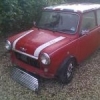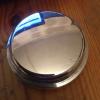
Torque Wrench
Started by
lewBlew
, Mar 12 2013 01:06 PM
23 replies to this topic
#16

Posted 12 March 2013 - 04:49 PM
It does say
Calibrated to BS EN ISO6789
Calibrated to BS EN ISO6789
#17

Posted 12 March 2013 - 04:51 PM
Which specifies an accuracy of +/-1% at 18-28c
#18

Posted 12 March 2013 - 05:03 PM
Does it happen to give the working range ?
The actual and working ranges are 2 different things.
Normally written on the calibration certificate, as the max and minimum tested values.
The actual and working ranges are 2 different things.
Normally written on the calibration certificate, as the max and minimum tested values.
Edited by mra-minis.co.uk, 12 March 2013 - 05:04 PM.
#19

Posted 12 March 2013 - 05:07 PM
Well it comes calibrated to BS EN ISO6789.The same applies to any such torque wrench, you may drop a mechanical one, if you are concerned on its accuracy, a test is you just need to use it in conjunction with a mechanical one or put a mechanical one on the other side to test the accuracy against it when you feel the need.
I found that comparing it against a good mechanical one it was pretty much correct ( if the mechanical one was), the deviation I if I remember correctly is +-5%, if you want a closer deviation it costs more for a +-2%.
There are digital Torque wrenches in the conventional design that are pretty expensive and accurate and I gather they are selling well so I guess they are pretty robust in a workshop environment.
I found that comparing it against a good mechanical one it was pretty much correct ( if the mechanical one was), the deviation I if I remember correctly is +-5%, if you want a closer deviation it costs more for a +-2%.
There are digital Torque wrenches in the conventional design that are pretty expensive and accurate and I gather they are selling well so I guess they are pretty robust in a workshop environment.
#20

Posted 12 March 2013 - 05:32 PM
Just read up in the instructions, it is accurate to +- 1% and comes with a calibration certificate, my certificate reads: set 72N,m reading 71.6, set 216N.m reading 215.2, set 360N.m 359.2 so pretty accurate for a cheapo
#21

Posted 12 March 2013 - 05:40 PM
That's pretty wide and 1% is good comes at a premium normally.
But you didn't read in the instructions to "test against a mechanical torque wrench" that is simply not accurate, neither is it a good idea.
Calibrating and testing a torque wrench requires fairly expensive testing equipment.
The electrical torque wrench will still have some moving parts and if dropped will still need recalibrating.
That said if you look after it then all should be well.
Don't ever use any torque wrench to undo a fastening.
But you didn't read in the instructions to "test against a mechanical torque wrench" that is simply not accurate, neither is it a good idea.
Calibrating and testing a torque wrench requires fairly expensive testing equipment.
The electrical torque wrench will still have some moving parts and if dropped will still need recalibrating.
That said if you look after it then all should be well.
Don't ever use any torque wrench to undo a fastening.
#22

Posted 12 March 2013 - 05:49 PM
It does not say to test against a mechanical, I did that just as an exercise of interest, it does however suggest how to reset the calibration if you suspect it may be out. Anyway I use it in conjunction with my other 2 mechanical ones. What I like about this one is you can track the force (readout) as applied and it will memorise the peak value you did eventually apply.
#23

Posted 12 March 2013 - 06:05 PM
I see you use the torque wrench to turn the fixing, does it say to do this in the operation manual ?
#24

Posted 12 March 2013 - 10:14 PM
Mine only goes down to about 40Nm. But if you feel how "loose" 30Nm feels you'll be able to pretty much feel it as Cooperman said. All the parts where torque is critical sor safety or structure etc are generally at the higher end. But if you can afford to have both then why not...
1 user(s) are reading this topic
0 members, 1 guests, 0 anonymous users

















